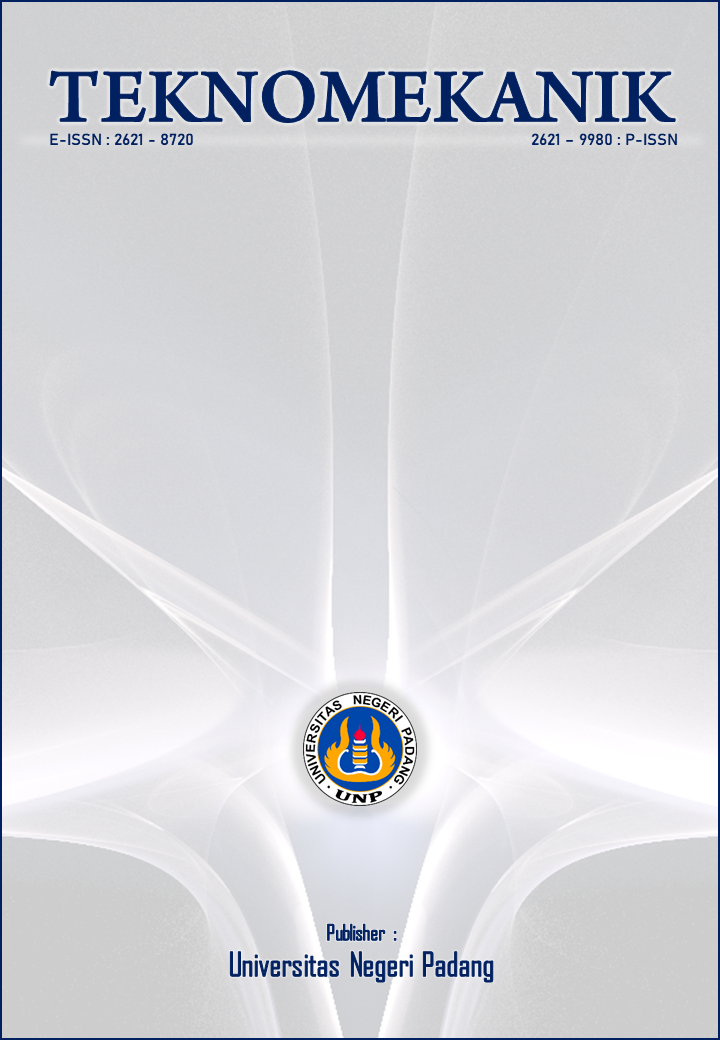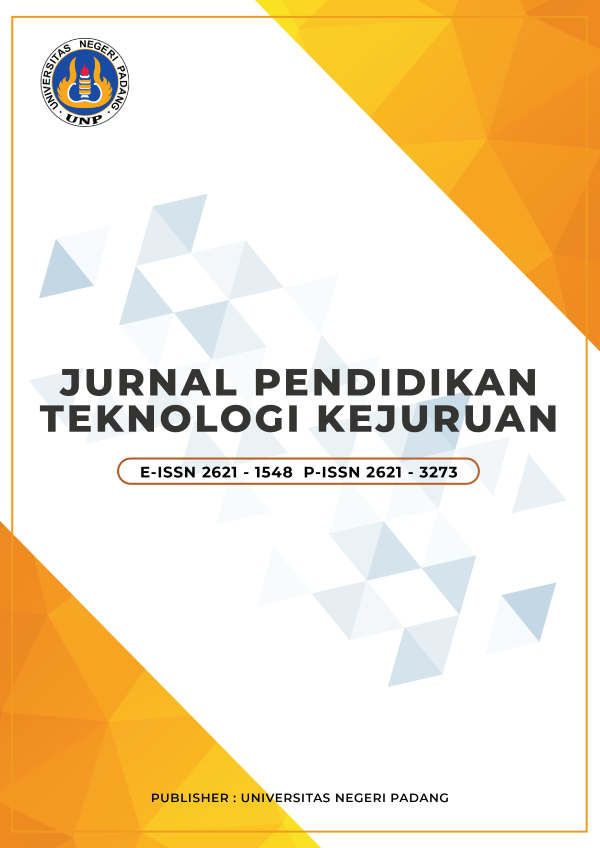Development of problem-based learning module on fundamentals of mechanical engineeri
DOI:
https://doi.org/10.24036/meej.v1i4.48Keywords:
Teaching module, Problem Based Learning, Fundamentals of Mechanical Engineering, module development, DDD-E., Teaching module, Problem Based Learning, Fundamentals of Mechanical Engineering, module development, DDD-EAbstract
This study aims to develop a teaching module based on Problem Based Learning (PBL) in the subject of Fundamentals of Mechanical Engineering for class X students of SMK Dhuafa Padang. This research uses the Research and Development (R&D) method with the DDD-E development model which includes four stages: Decide, Design, Develop, and Evaluate. The developed module aims to increase students' engagement in learning as well as their ability to solve problems through a problem-based approach. The developed module was validated by three experts, namely material, media, and language experts. The validation results showed a very good level of validity, with the percentage of validation as follows: material aspect of 98.33%, media aspect of 91.76%, and language aspect of 92.5%, which indicates this module is very valid and feasible to use. In addition, the practicality test was conducted by class X students, and the results showed that this module was very practical with a practicality score of 88.21%. In conclusion, this Problem-Based Learning-based teaching module is effective and practical to use in learning Fundamentals of Mechanical Engineering, and can increase students' active participation and their problem-solving skills. This module is expected to be a useful reference in the development of vocational learning that is more relevant to the needs of the industrial world.
Downloads
References
Manalu, J. B., Sitohang, P., Heriwati, N., & Turnip, H. (2022). Pengembangan Perangkat Pembelajaran Kurikulum Merdeka Belajar. Jurnal Mahesa Research Center, 1(1), 80â86. https://doi.org/10.34007/ppd.v1i1.174
Ningrum, A. S. (2022). Pengembangan Perangkat Pembelajaran Kurikulum Merdeka Belajar (Metode Belajar). Prosiding Pendidikan Dasar. URL: https://journal.mahesacenter.org/index.php/ppd/index https://doi.org/10.34007/ppd.v1i1.186
Auliah, L., Syaiful, S., & Syamsurizal, S. (2020). Pengembangan Modul Digital Pembelajaran Matematika Berbasis Pendekatan Open Ended Untuk Meningkatkan Kemampuan Berpikir Kreatif Matematis. Jurnal PendidikanMatematika,11(1),13. https://doi.org/10.36709/jpm.v11i1.9885
Nisak, K., & Istiana, D. A. (2017). Pengaruh Penerapan Problem Based Learning Terhadap Kemampuan Pemecahan Masalah Matematika Siswa. http://journal.lppmunindra.ac.id/index.php/jkpm/
Likert RA. (1932). Technique for the measurement of attitudes. Archives of Psychology, 140 pp: 1-55.
Kemendikbud. (2022). Permendikbud Nomor 16 Tahun 2022 Tentang Standar Proses Pendidikan dan Menengah. Jakarta: Kementerian Pendidikan dan Kebudayaan.
Smith, J., & Johnson, A. (2021). The impact of module-based learning on student outcomes: Structuring and facilitating deep conceptual understanding. Journal of Educational Research, 45(2), 123-135.
Sari, R., et al. (2020). Pengembangan perangkat ajar berbasis modul dalam meningkatkan kualitas pembelajaran. Jurnal Pendidikan dan Pengajaran, 32(1), 45-58.
Syamsurizal. (2020). Pengembangan modul ajar yang efektif: Kriteria dan penggunaannya dalam pembelajaran. Jurnal Pendidikan, 28(3), 112-124.
Kim, Y., & Lee, S. (2018). Effectiveness of Problem-Based Learning (PBL) in vocational education: Enhancing student engagement and problem-solving skills. Journal of Vocational Education and Training, 40(2), 115-129.
Syaodih, N. (2005). Metodologi Penelitian Pendidikan. Bandung: Remaja Rosdakarya.
Budiyono. (2017). Metode Penelitian Research and Development (R & D) dalam Bidang Keahlian. Surakarta: Universitas Sebelas Maret.
Kusuma, A. (2018). Teknik Konversi dan Pengembangan Produk dalam R&D. Yogyakarta: Pustaka Pelajar.
Yudianto, H., Widyastara, A., & Wijarwanto, F. (2021). Dasar Dasar Teknik Mesin. (Wulan Aprilliyah Utami, Ed.; 1st ed.). Pusat Kurikulum dan Perbukuan Badan Penelitian dan Pengembangan dan
Perbukuan Kementerian Pendidikan, Kebudayaan, Riset, dan Teknologi.
Kustandi, Cecep. , dan D. Daddy. (2021). Pengembangan Media Pembelajaran.
Sari, P. K., & Sutihat, S. (2022). Pengembangan E-Modul Berbasis STEAM untuk Meningkatkan Kemampuan Berpikir Tingkat Tinggi Pada Pembelajaran Tematik di SD. Jurnal Pendidikan Sains Indonesia (Indonesian Journal of Science Education), 10(3), 509-526. (2)
Aldo, N., Revita, R., & Nurdin, E. (2021). Pengembangan Modul Berbasis Problem Based Learning pada Materi Statistika SMP Kelas VIII. JRPM (Jurnal Review Pembelajaran Matematika), 6(2), 115â129. https://doi.org/10.15642/jrpm.2021.6.2.115-129
Shobrina, N. Q., Sakti, I., & Purwanto, A. (2020). Pengembangan Desain Bahan Ajar Fisika Berbasis E-Modul Pada Materi Momentum. Jurnal Kumparan Fisika, 3(1 April), 33â40. https://doi.org/10.33369/jkf.3.1.33-40
Downloads
Published
How to Cite
Issue
Section
License
Copyright (c) 2024 Qhairunnisa

This work is licensed under a Creative Commons Attribution-ShareAlike 4.0 International License.
Most read articles by the same author(s)
- Pres Megari, Mulianti Mulianti, Yufrizal A, Implementation of Project-Based Learning Model in Lathe Machining Technique Subjects to Improve Student Learning Outcomes , Mechanical Engineering Education Journal: Vol. 1 No. 2 (2023): Regular Issue
- Arifin Adli, Ambiyar Ambiyar, Refdinal Refdinal, Purwantono Purwantono, The Influence of Project-based Learning Model on mechanical Engineering Drawing Learning Outcomes , Mechanical Engineering Education Journal: Vol. 1 No. 1 (2023): Regular Issue
- Hanafi Akbar, Mulianti Mulianti, Irzal Irzal, Adri Junil, Relationship between the completeness of occupational safety facilities and the rate of workplace accidents , Mechanical Engineering Education Journal: Vol. 1 No. 2 (2023): Regular Issue




